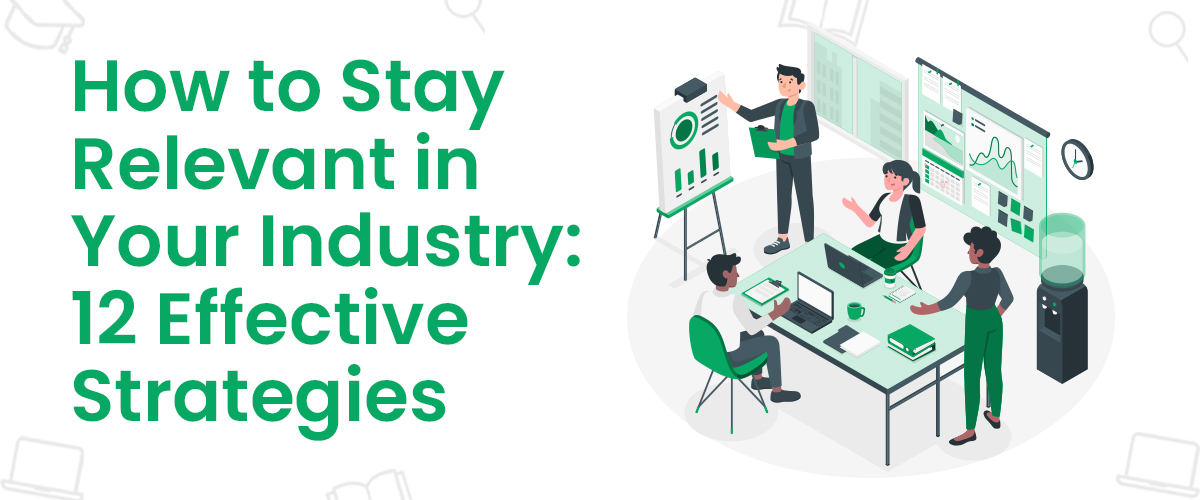











Compare India's leading
universities on a single platform
within two minutes.
- Online MBA for job professionals 100 + Universities
- 30X comparison factors
- Free expert consultation
- Quick Loan facility
- Post Admission Support
- Learnify Exclusive Community
- Job + Internship Portal
How to Stay Relevant in Your Industry: 12 Effective Strategies
- No-Cost EMI From ₹5100/-
- Subsidy Available upto ₹20,000/-

In today’s fast-evolving professional world, staying relevant in your industry is not just an option—it’s a necessity. The rapid advancements in technology, market trends, and consumer behavior demand that professionals continuously upgrade their skills, knowledge, and network to remain competitive. Whether you are an entrepreneur, employee, or freelancer, staying updated with industry trends can set you apart and open doors to new opportunities.
Here’s how you can stay relevant and ensure long-term career success.
Why Is Staying Relevant Important?
Industries are changing at a rapid pace. Companies are adopting new technologies, altering work processes, and updating strategies to stay ahead. If you fail to adapt, you risk being left behind. By keeping yourself updated, you can:
- Enhance employability – Employers prefer candidates who demonstrate a willingness to learn and adapt.
- Increase career growth opportunities – Staying relevant gives you a competitive edge and opens up promotions or leadership roles.
- Improve job security – Adapting to changes in the industry makes you an indispensable asset to your organization.
- Stay ahead of the competition – Knowing the latest trends helps you position yourself as an industry expert.
- Boost confidence – Learning new skills and understanding industry trends give you the confidence to take on challenges effectively.
Now, let’s dive into 12 effective ways to stay relevant in your industry.
1. Follow Industry Leaders and Experts
Staying informed is the key to success. Follow key influencers, professionals, and thought leaders in your industry. Subscribe to their blogs, LinkedIn updates, and social media content. Many industry experts share valuable insights, research, and trends that can help you stay ahead.
- Join discussion forums related to your industry to engage in meaningful conversations.
- Listen to industry podcasts to absorb knowledge while on the go.
- Watch webinars and interviews featuring industry leaders sharing their insights.
2. Attend Industry Events and Webinars
Networking and learning from experts is essential for growth. Participate in:
- Conferences and summits – These provide a platform to learn about new trends and best practices.
- Webinars and virtual events – A cost-effective way to gain insights from top industry professionals.
- Trade shows and expos – Discover the latest innovations and form valuable connections.
- Networking events – Meet like-minded professionals, share experiences, and build business relationships.
3. Invest in Continuous Learning and Upskilling
Lifelong learning is crucial for professional growth. Consider:
- Online courses: Platforms like Coursera, Udemy, and LinkedIn Learning offer industry-specific courses to enhance your skills.
- Certifications: Advanced certifications enhance your credibility and make you stand out.
- Workshops and hands-on training: Practical training can improve your expertise in a niche field.
- Professional degrees and executive programs: Higher education can deepen your knowledge and increase your career prospects.
4. Adapt to Technological Advancements
Technology is evolving rapidly, and industries are integrating AI, automation, and data analytics into their operations. Learn how technology impacts your field and develop relevant technical skills to stay ahead.
- Keep an eye on AI advancements that may reshape your industry.
- Learn about automation tools that can enhance efficiency.
- Familiarize yourself with data analytics to make data-driven decisions.
5. Enhance Your Communication Skills
Being an effective communicator is essential for career growth. Improve your:
- Public speaking skills – Attend public speaking workshops or join Toastmasters.
- Writing abilities – Develop strong written communication skills through blogging and content creation.
- Interpersonal communication – Build rapport with colleagues, clients, and stakeholders.
Good communication helps in networking, pitching ideas, and collaborating effectively with peers.
6. Engage With Your Professional Network
Building strong relationships within your industry helps you access new opportunities. Join:
- LinkedIn groups to participate in discussions and stay informed.
- Professional associations related to your field.
- Networking forums and local meetups for industry professionals.
Engaging in meaningful conversations and staying connected with colleagues keeps you informed about industry changes.
7. Stay Updated With Industry News and Publications
Subscribe to reputable sources such as:
- Industry-specific blogs and news portals.
- Business magazines like Forbes and Harvard Business Review.
- Trade journals and research publications.
- Government and market reports for insights into policy changes and economic trends.
Reading credible sources regularly keeps you informed and ahead of your competition.
8. Learn From Your Competitors
Understanding your competitors’ strategies helps you stay competitive. Monitor their:
- Business models to see what works and what doesn’t.
- Marketing techniques to identify gaps in your own strategy.
- Technological advancements to adopt the latest innovations.
Competitor analysis allows you to adopt new strategies and improve your own practices.
9. Be Open to Change and Innovation
The ability to adapt to new ideas and innovations is a valuable trait. Experiment with new techniques, tools, and approaches to problem-solving to stay ahead in your industry.
- Embrace new trends and methodologies.
- Be proactive in implementing innovative solutions.
- Encourage creativity and out-of-the-box thinking.
10. Become an Industry Specialist
Instead of being a generalist, focus on developing expertise in a specific niche. Specialization makes you a valuable asset, increasing your demand in the industry.
- Identify a niche that aligns with your passion and industry needs.
- Gain advanced knowledge and hands-on experience in your chosen field.
- Establish yourself as a go-to expert through content creation and speaking engagements.
11. Build Your Personal Brand
A strong personal brand enhances your professional visibility. Establish yourself as an authority by:
- Creating valuable content on LinkedIn and social media platforms.
- Writing industry-related blogs and articles.
- Speaking at industry events and panel discussions.
Showcasing your expertise builds credibility and attracts career opportunities.
12. Collaborate and Form Alliances
Collaboration opens doors to new learning opportunities. Partner with:
- Industry peers to exchange ideas and experiences.
- Cross-functional teams to broaden your knowledge base.
- Business alliances to expand your reach and market presence.
Joint ventures, guest blogging, and knowledge-sharing initiatives can help expand your reach and knowledge.
Final Thoughts
Staying relevant in your industry requires continuous learning, adaptability, and proactive networking. By implementing these 12 strategies, you can ensure long-term career success, stay ahead of the competition, and become an industry leader.
Make lifelong learning a habit, engage with professionals, and leverage new technologies to maintain your professional relevance. Start today and future-proof your career!


